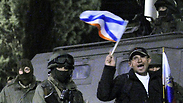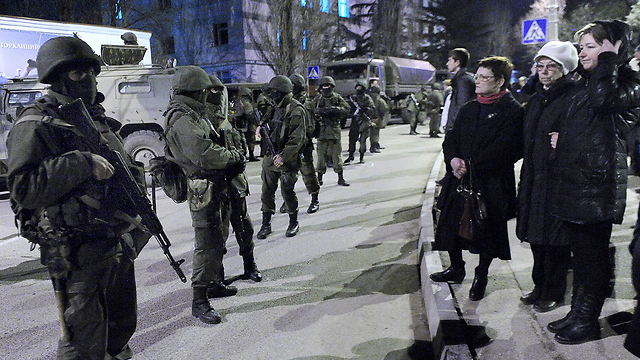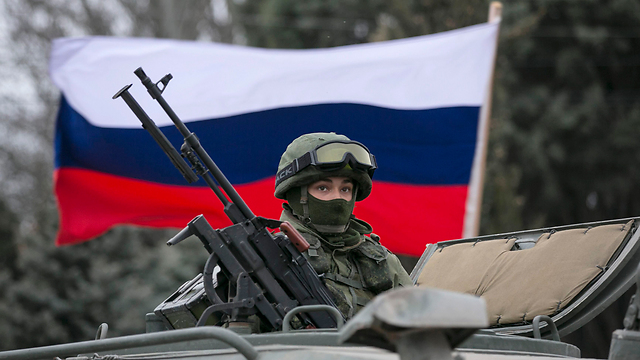
Ukraine asks UN council: Stop Russian 'aggression'
Obama, UN chief phone Putin urging him to de-escalate situation in Crimea and 'urgently engage in direct dialogue with (Ukrainian) authorities.'
Ukraine's ambassador to the United Nations asked an emergency session of the Security Council on Saturday "to do everything possible now" to stop Russia's "aggression" as its troops took over the strategic Crimea region.
But action by the UN's most powerful body appears unlikely. As a permanent member, Russia has veto power and can block the council from adopting any resolution criticizing or sanctioning Moscow.
UN Secretary-General Ban Ki-moon urged Russian President Vladimir Putin in a phone call to "urgently engage in direct dialogue with the authorities" in Kiev.
President Barack Obama on Saturday called on Russian President Vladimir Putin to de-escalate the tense atmosphere in Ukraine by pulling his forces back to bases in the country's Crimean region and to refrain from interfering elsewhere in the former Soviet republic.
Obama personally delivered the message to Putin during a 90-minute telephone conversation, the White House said late Saturday.
But Obama's request appeared likely to go unheeded as the Kremlin said Putin, in turn, emphasized to Obama the existence of real threats to the life and health of Russian citizens living in Ukraine and that Russia has the right to protect its interests there.
Related stories:
- Obama expresses deep concern to Putin over Ukraine
- Ukraine puts forces on combat alert, warns of war
- Russian parliament authorizes military use in Ukraine
The governor of Russia's Belgorod region said on Sunday armed groups had tried to cut off a road leading to Ukraine, Russia's Interfax news agency reported.
"Armed men are roaming the area ... There was an attempt to close off the road from Moscow to Crimea," Yevgeny Savchenko was quoted as saying about events on Saturday. "This is really troubling."
Calling the situation in Ukraine "as dangerous as it is destabilizing," US Ambassador to the UN Samantha Power told the council, "It is time for the Russian military intervention in Ukraine to end."
Power and other members of the council called for sending international monitors to Ukraine as soon as possible to observe the situation, and Power warned that "Russia's provocative actions could easily push the situation beyond the breaking point." She also mentioned work on an international mediation mission to send to Ukraine.
The Security Council met in emergency session for the second straight day on the rapidly developing events in Ukraine. It even met briefly in an open, televised session, despite objections from Russia, then resumed meeting behind closed doors.
Current council president, Luxembourg Ambassador Sylvie Lucas, said members stressed the importance of Ukraine's territorial integrity and the need to lower tensions, in addition to the need for international monitors.
Russia's UN ambassador, Vitaly Churkin, said the new government in Kiev needs to get away from "radicals" and warned that "such actions they're taking could lead to very difficult developments, which the Russian Federation is trying to avoid."
Churkin also accused the West of interfering in the recent Kiev demonstrations that turned violent amid tensions over the decision by Ukraine's now-fugitive president, Viktor Yanukovych, to turn Ukraine toward Russia, its longtime patron, instead of the European Union.
Russia has given refuge to Yanukovych, who fled a week ago.
Churkin said Russia was intervening at the request of pro-Russian authorities in the semi-autonomous Crimea, which is largely Russian-speaking and home to Russia's Black Sea navy fleet.
British Ambassador Mark Lyall Grant, who called for Saturday's meeting, told reporters afterward that "there is no justification for Russia's military activities in the last 48 hours."
Deputy Secretary-General Jan Eliasson called the situation in Ukraine "very difficult and very dangerous" and said they were seeing "negative signs, serious signs, risks of escalation."
Russian rejection
Ukraine's UN ambassador, Yuriy Sergeyev, asked the other four permanent Security Council members – the US, Britain, France and China – for help, adding that Russia had rejected Ukraine's proposal to hold immediate bilateral consultations.When asked later whether Ukraine is at war with Russia, Sergeyev said, "No. We are not at war. We are trying to avoid any clashes. We are being provoked."
Ban, the UN chief, said earlier Saturday that he is "gravely concerned about the deterioration of the situation" in Ukraine and called for "full respect for and preservation of the independence, sovereignty and territorial integrity" of the country.
Ban later spoke by telephone with Putin, and a statement from Ban's office said, "It is crucial to restore calm and proceed to an immediate de-escalation of the situation."
"Cool heads must prevail, and dialogue must be the only tool in ending this crisis," Ban said.
Ban planned to meet Sunday in Geneva with his special envoy Robert Serry, the Netherlands' first ambassador to Ukraine.
Ban on Friday asked Serry to go to Crimea as part of a fact-finding mission. However, after consulting with authorities in the region, Serry decided that a visit was not possible.
Lyall Grant said his understanding was that Serry couldn't go because airspace above Crimea has been closed. Eliasson called the decision "purely logistical."












